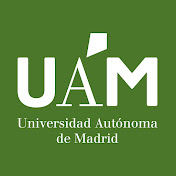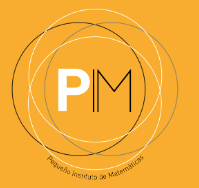Investigación
Noticias Destacadas
 Agenda del Departamento Agenda del Departamento |
- Información (provisional) sobre grupos y horarios de las asignaturas impartidas por el Departamento de Matemáticas, para el curso 2023-2024.
- Propuestas de Trabajos de Fin de Grado para el curso 2023-2024.
|
Canal @matematicasuamEnlace al canal del Departamento en youtube. |
PIM (Pequeño Instituto de Matemáticas)Con el objetivo de fomentar el interés por las matemáticas y dirigido a jóvenes entre 14 y 18 años, nace este proyecto de Instituto de Ciencias Matemáticas (ICMAT) en colaboración con nuestro Departamento, la Universidad Autónoma de Madrid y la Real Sociedad Matemática Española. El proyecto comienzó en el curso académico 2022-2023. Ampliar información en su página web. |
Seminario Teoría de grupos 17/02
11:30 Aula Naranja ICMAT
Speaker: Jan Boschheidgen (UAM)
Title: Non convergence of eigenvalue measures associated to residual chains
Abstract: Let $G$ be a discrete residually finite group and let $A in text{Mat}_n(mathbb{C}[G])$. Let $G unrhd N_1 unrhd N_2 ldots$ be a chain of normal subgroups of finite index with trivial intersection. Set $G_i = G / N_i$. Then $A$ acts by right multiplication via reduction modulo $N_i$ on $mathbb{C}[G_i]^n$. Since $mathbb{C}[G_i] cong mathbb{C}^{vert G_i vert}$ as $mathbb{C}$-vector spaces, this action can be represented by a matrix $A_i in text{Mat}_{n cdot vert G_i vert}(mathbb{C})$. For every $i$ let now $lambda_1^{(i)}, ldots , lambda_{n cdot vert G_i vert }^{(i)}$ be the eigenvalues of $A_i$ and define
$mu_i = frac{1}{vert G_i vert}sumlimits_{k = 1}^{n cdot vert G_i vert } delta_{lambda_k^{(i)}}$,
Where $delta_c$ denotes the Dirac measure at $c in mathbb{C}$.
We now can ask the following questions:
(1) Does the limit $limlimits_{i to infty} mu_i ({0 })$ exist?
(2) If the answer to the first question is yes, does the limit depend on the chain ${N_i}$?
(3) Let $mathcal{N} (G)$ denote the group von Neumann algebra. We can consider $A$ as an element of the tracial von Neumann algebra $text{Mat}_n(mathcal{N} (G))$ acting on the Hilbert space $(ell^2 (G))^n$. Therefore we can define the Brown measure $mu_A$ of $A$ and ask: Does the sequence $mu_i$ converge weakly to $mu_A$?
All these questions have been already studied for the case when $A$ is normal. In this case the answer to all questions is positive. In this talk we will show that in general the answers to questions (2) and (3) are negative.
https://dominik.francoeur.xyz/seminar.html






